Personal Finance Tips and Tricks for Freelancers
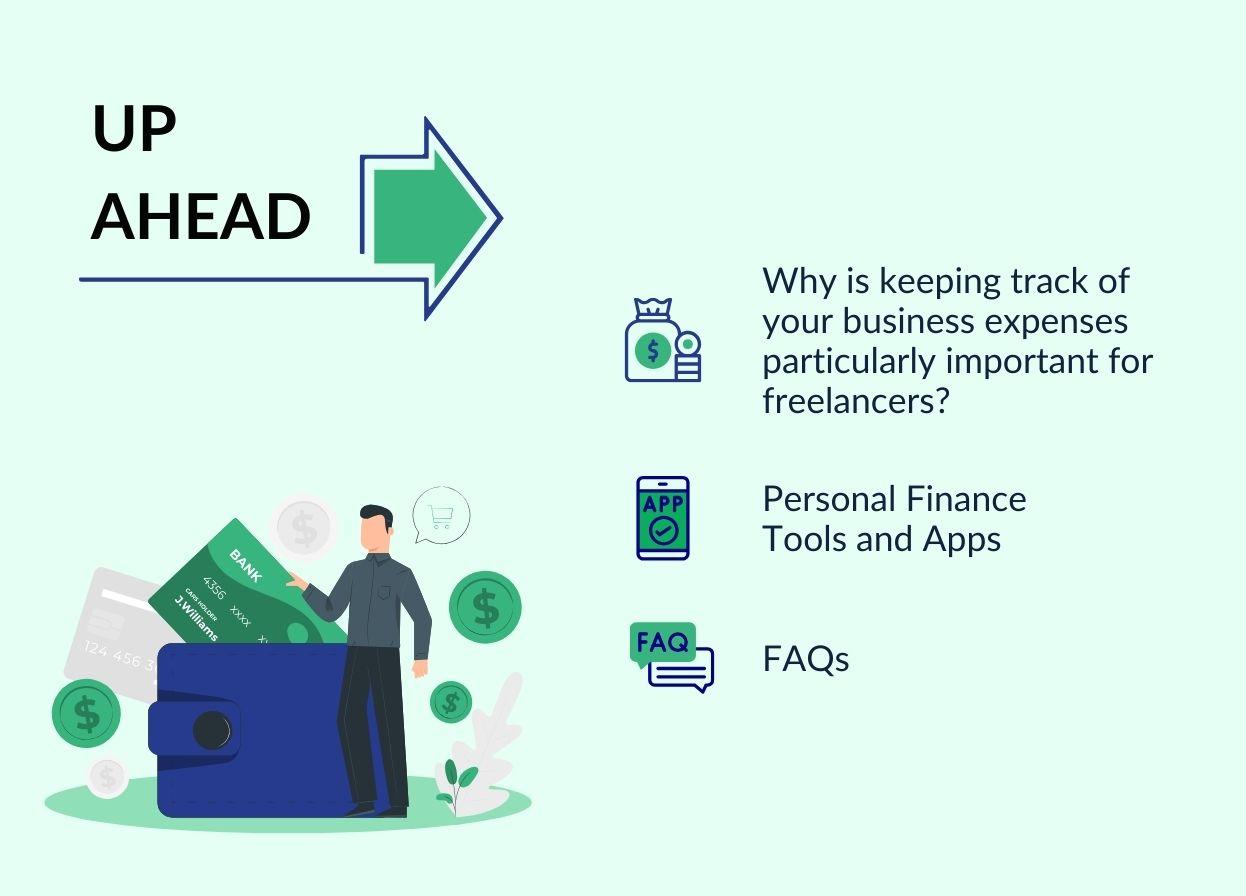

Freelancing offers a world of independence and creative freedom, allowing individuals to transform their passions into viable careers. However, amid the exhilaration of self-employment, freelancers face the unique challenge of managing their finances effectively.
Managing personal finances for freelancers becomes difficult as the earnings fluctuate regularly due to multiple clients and delayed payments, making it vital to ensure you cover current and future expenses.
This blog delves into the best practices for freelancers in the realm of money management by providing valuable insights toward maintaining a healthy financial pulse, ensuring that your freelance journey is creatively fulfilling and financially sustainable.
Why is keeping track of your business expenses particularly important for freelancers?
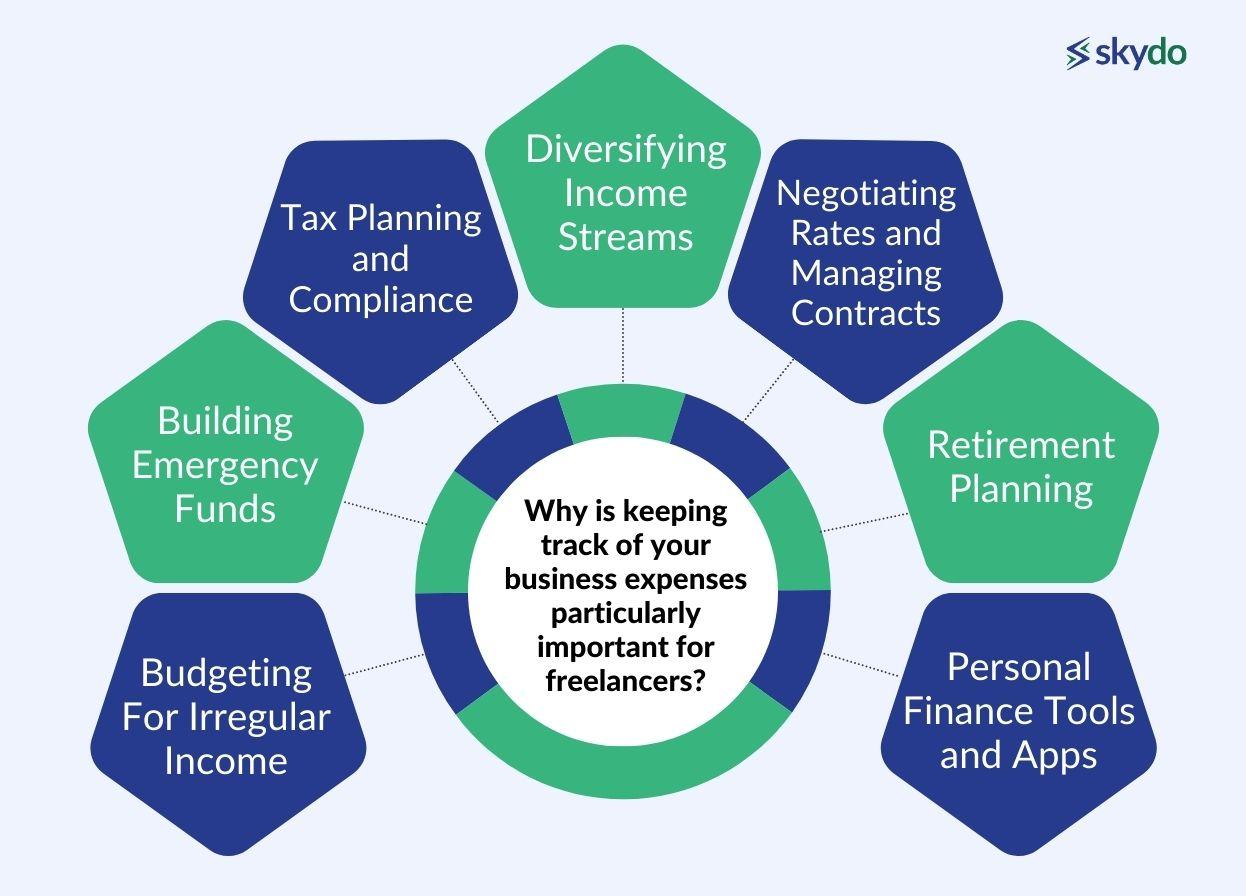
1. Expense Management:
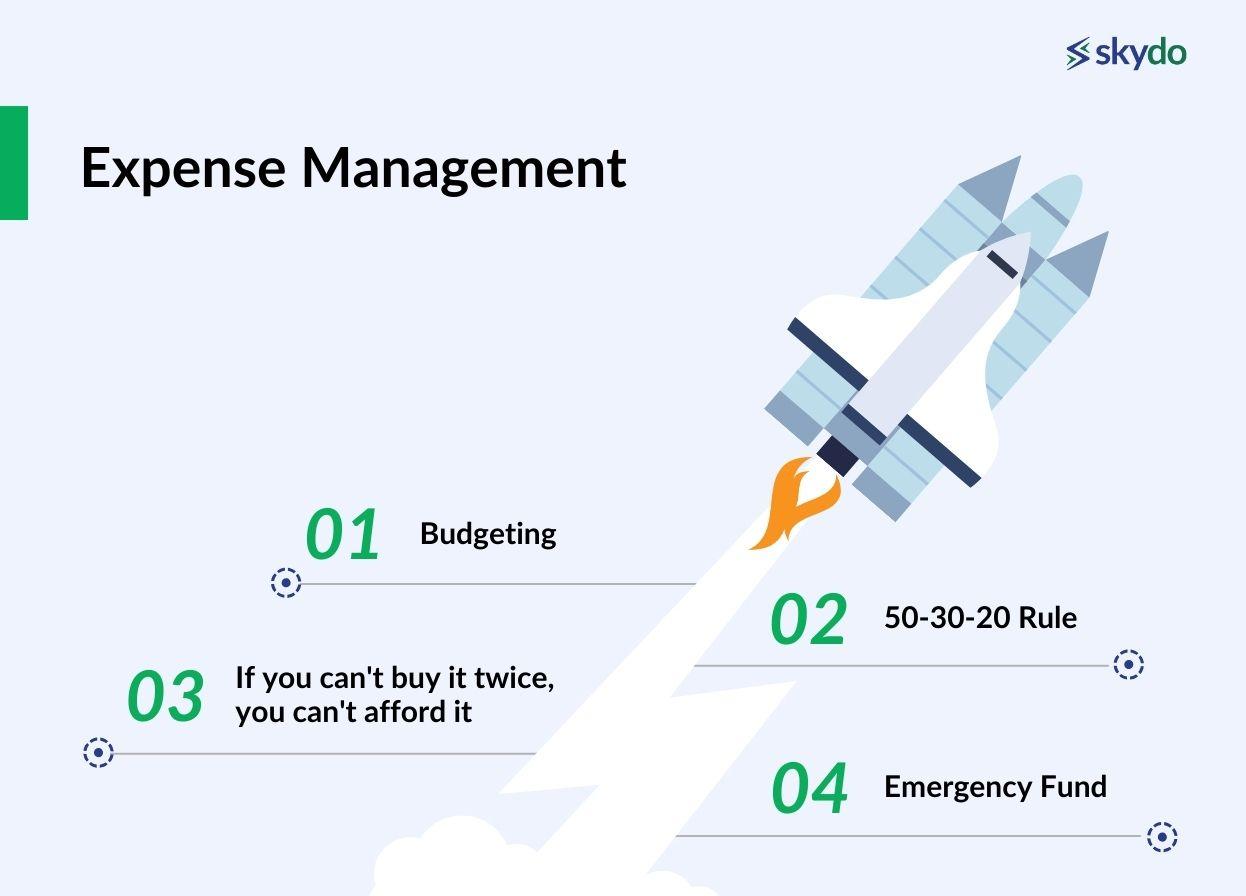
- Budgeting: Establishing a detailed budget is the bedrock of financial stability for freelancers. Begin by meticulously tracking your income and categorizing your expenses. This not only provides a clear snapshot of your financial health but also enables you to identify areas where you can optimize spending. Utilize budgeting tools or apps to streamline this process, making it easier to adhere to your financial plan.
- If you can't buy it twice, you can't afford it: This insightful rule serves as a practical filter for decision-making. Before making any non-essential purchase, consider whether you have the financial capacity to buy it twice. If not, reconsider the expense to prevent unnecessary strain on your budget and ensure that your spending aligns with your financial goals.
- 50-30-20 Rule: Allocate 50% to necessities like rent, utilities, and groceries, ensuring your basic needs are met. Dedicate 30% to discretionary spending, allowing for flexibility and enjoyment in your lifestyle. Reserve the remaining 20% for savings and debt repayment, promoting financial security and long-term stability.
- Emergency Fund: Aim to save 3-6 months' worth of living expenses in a dedicated account. This fund acts as a financial safety net, providing peace of mind during unforeseen circumstances such as unexpected medical expenses, equipment failures, or periods of lower income.
2. Investments:
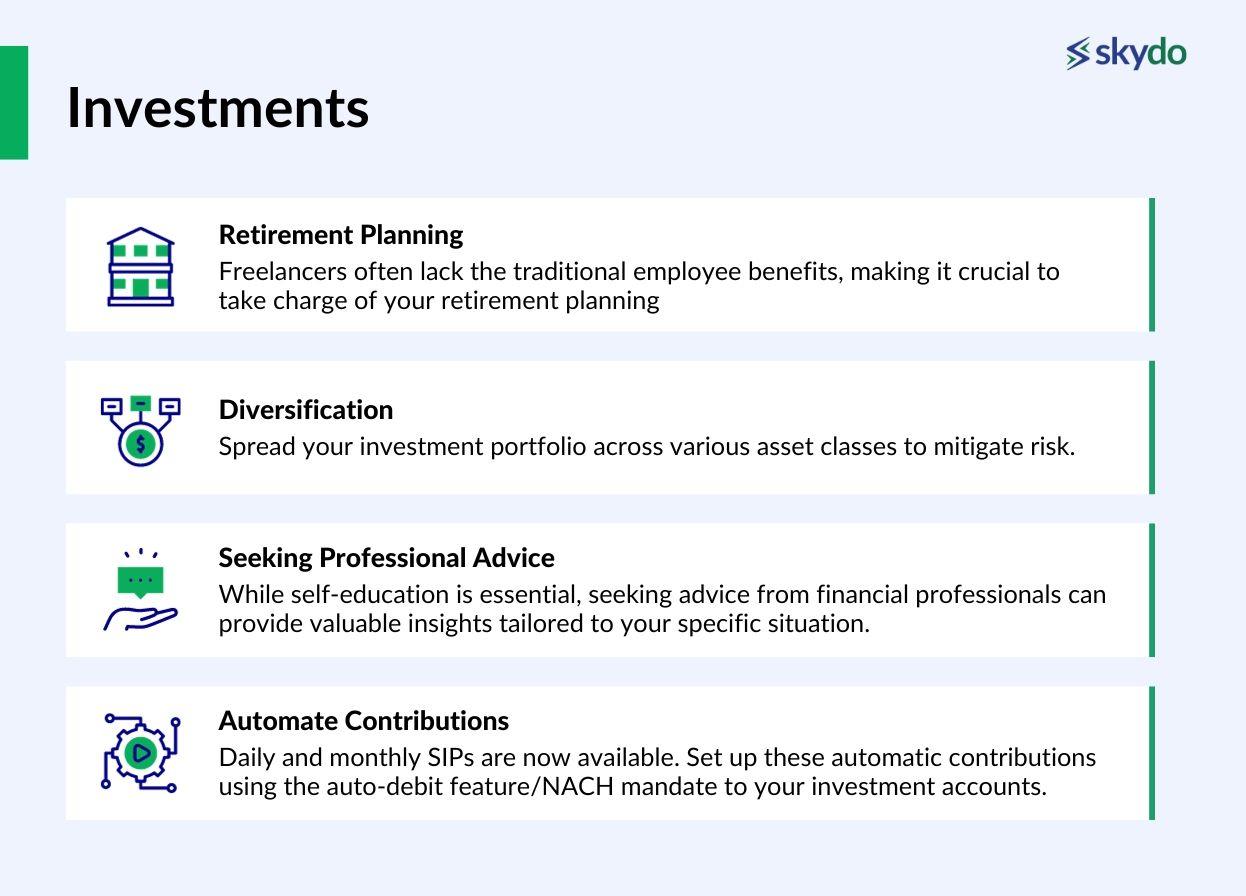
- Retirement Planning: Freelancers often lack the traditional employee benefits, making it crucial to take charge of your retirement planning. Begin by contributing to retirement accounts such as a Personal Provident Fund (PPF) or long-term equity mutual funds. Start early to leverage the power of compounding, securing a comfortable retirement.
- Diversification: Spread your investment portfolio across various asset classes to mitigate risk. Diversification can include a mix of stocks, bonds, real estate, and other investment vehicles. A well-diversified portfolio is better positioned to weather market fluctuations.
- Seeking Professional Advice: While self-education is essential, seeking advice from financial professionals can provide valuable insights tailored to your specific situation. A financial advisor can help craft an investment strategy aligned with your goals, risk tolerance, and time horizon.
- Automate Contributions: Daily and monthly SIPs are now available. Set up these automatic contributions using the auto-debit feature/NACH mandate to your investment accounts. This disciplined approach ensures consistent savings and capitalizes on rupee-cost averaging.
3. Taxation:
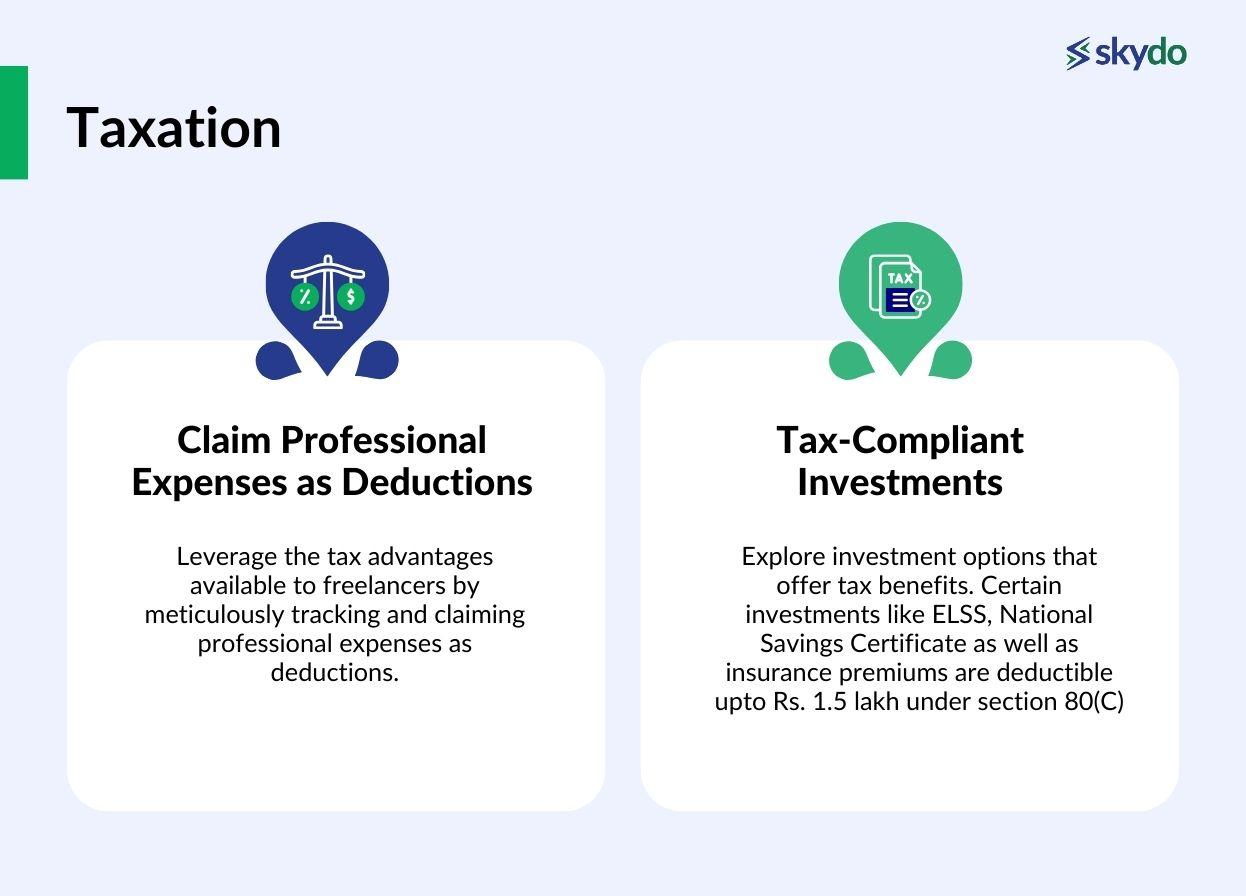
- Claim Professional Expenses as Deductions: Leverage the tax advantages available to freelancers by meticulously tracking and claiming professional expenses as deductions. This can include home office expenses, software subscriptions, travel costs, and other work-related expenditures. Keep detailed records and work with a tax professional to maximize your deductions.
- Tax-Compliant Investments: Explore investment options that offer tax benefits. Certain investments like ELSS, National Savings Certificate as well as insurance premiums are deductible upto Rs. 1.5 lakh under section 80(C). Premium paid for dependent parents is also deductible under section 80(DD). Understanding the tax implications of your investments allows you to make informed decisions aligned with your financial goals.
4. Credit Management:
- Build Credit History and Better Score: Paying off small loans in time helps you get bigger loans later in life. Regularly check your credit report for accuracy and take steps to improve your credit score. Timely payments, responsible credit use, and minimizing outstanding debts contribute to a favorable credit profile.
- Use Credit for Business-Related Purchases: Utilize credit strategically for business-related expenses, such as equipment purchases or professional development courses. Be disciplined in managing credit to avoid accumulating unnecessary debt and ensure that credit utilization remains within reasonable limits.
- Live Below Your Means: Don't let personal debt pile. Avoid the temptation to fund personal expenses with credit, especially during lean months. Living below your means ensures that your financial obligations are manageable, reducing the risk of accumulating personal debt.
5. Insurance:
- Health Insurance: You don’t have access to employer-sponsored health insurance. Health insurance provides financial protection against medical expenses, ensuring that you can access necessary healthcare without incurring significant out-of-pocket costs.
- Life Insurance: Life insurance provides financial protection for your loved ones in the event of your passing. Consider term life insurance (usually a cover of 20 times your current annual income) as an affordable option that covers a specific period. Assess your financial obligations, such as outstanding debts or dependents, to determine an appropriate coverage amount.
6. Add Income Streams:

- Royalties: Diversify your income sources by exploring opportunities for royalties. If you possess skills or create content with potential long-term value, consider licensing or selling the rights to your work. This can lead to ongoing royalty payments, providing a steady stream of income.
- Interest & Dividend: Invest in income-generating assets such as stocks, bonds, or dividend-paying stocks. Earnings from interest and dividends can serve as passive income, contributing to your overall financial stability without requiring active involvement in day-to-day business activities.
- Sweat Equity in Promising Ventures: Collaborate with clients or partners on ventures where your expertise can contribute to the success of the project. In exchange for your skills and efforts, negotiate for a share of the business or project—commonly known as sweat equity. This only adds another income stream.
7. Bonus Tip: Upskilling
- Better Sales Strategy: Sharpen your sales skills to effectively market your services and attract more clients. Understand your clients' needs, articulate the unique value you bring, and develop persuasive communication techniques.
- Better Pricing Strategy: Evaluate and adjust your pricing strategy to reflect the value you provide. Don't undervalue your skills—consider factors like expertise, project complexity, and market rates when setting prices. A well-thought-out pricing strategy ensures fair compensation for your work and contributes to long-term financial success.
- Better Negotiation Skills: Hone your negotiation skills to secure favorable terms with clients and collaborators. Whether it's project rates, deadlines, or terms of collaboration, effective negotiation can result in better financial outcomes. Be confident, articulate, and open to finding win-win solutions in your professional relationships.
Personal Finance Tools and Apps
Apps and tools such as YNAB, Mint, Goodbudget, PocketGuard, ET Money, Groww, and Monefy can help you manage your personal finances. Utilizing these apps and tools can also help with constant monitoring and making real-time adjustments accordingly. When choosing a personal finance tool or app, consider your specific financial needs, preferences, and the features that align with your goals.
Conclusion
Freelance management is as important as onboarding clients and offering services, as freelancers witness regular earning fluctuations and payment delays. Unlike salaried employees who know how much money they will receive on a particular date, freelancers must ensure personal finance management for a balanced approach.
By embracing a proactive approach to retirement planning, exploring diverse income streams, and leveraging technology through tailored personal finance tools and apps, freelancers can tackle economic uncertainties and set themselves up for long-term success.
As a freelancer, if you have international clients, you can create an account on Skydo to receive foreign currency payments seamlessly without creating a traditional foreign currency account.
FAQs
Q1. What are the best practices for invoicing and managing cash flow?
Ans: The best practices for invoicing include using professional invoicing templates that clearly specify the nature of the work and payment terms, along with a detailed description of the work done.
The best practices for managing cash flow include maintaining an emergency fund, budgeting as a freelancer, diversifying income streams, negotiating payment terms, and investing for steady returns and capital appreciation.
Q2. How do I negotiate payment terms and contracts with clients?
Ans: For negotiating payment terms and contracts with clients, create a detailed portfolio of your past work with a cover letter to showcase how you can help the client and create value. Set clear boundaries on the nature of work, daily deadlines, and the payment you want for the services offered.
Q3. Is it essential to work with an accountant or financial advisor?
Ans: Although working with an accountant or financial advisor isn't essential, it is always wise to consult one. If you feel you aren’t fully equipped to monitor and manage your freelance finances, an accountant or a financial advisor will ensure the best financial planning for the self-employed.
Q4. How can I protect myself financially during lean months?
Ans: The best way is to create an emergency fund that has an amount that can cover your expenses for at least three to six months. You can also invest in investment instruments such as mutual funds, equities, and bonds to give you a steady income.
Q5. Should I form a business entity for tax purposes?
Ans: It isn’t essential to create a business entity for tax purposes, as the income you generate as a freelancer is considered your personal income, on which you can pay taxes as per your applicable tax slab. You can also deduct business expenses from your taxable income. However, it is beneficial to ensure effective tax planning by investing in tax-saving investments. Please consult a tax advisor for details.












